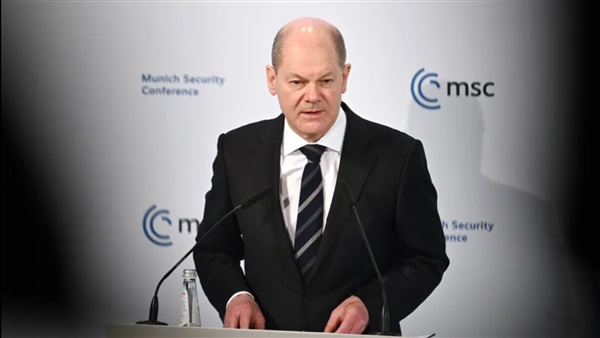Munich Security Conference 2022: Olaf Scholz says ‘War threatens Europe once again’

Speaking at the Munich Security Conference, German
Chancellor Olaf Scholz once again threatened Russia with consequences in the
event of an attack, while US Vice President Kamala Harris spoke of
“unprecedented” sanctions.
Scholz, of the Social Democratic Party, still sees the
danger of a military conflict with Russia. "War threatens Europe once
again. The danger has not been averted by anything," he said at the Munich
Security Conference.
Global challenges such as the coronavirus pandemic and the
fight against climate change are currently lagging behind this danger in the
public debate.
Scholz again called on Russia to de-escalate, as nothing
justifies the deployment of more than 100,000 Russian soldiers around Ukraine.
He said that Russia had raised the question of Ukraine's possible NATO
membership as a “reason for war,” which is a contradiction, “because no
decision is pending.” At the same time, he declared that the right to free
choice of NATO, including the primary possibility of Ukraine joining the
alliance, is non-negotiable.
Scholz warned of the consequences of a possible Russian
attack on Ukraine, saying, “Any further violation of Ukraine's territorial
integrity will have huge costs for Russia politically, economically and
geostrategically.” However, he remained open to diplomacy.
Germany is ready to negotiate with “as much diplomacy as
possible without being gullible, that's the claim,” Scholz said, adding that a
distinction must be made between Russia's untenable demands and legitimate
security interests.
There are security issues “important to both sides. Above
all, transparency in weapons systems and training, risk aversion mechanisms or
new methods of arms control,” he said.
Kamala Harris threatens to impose “unprecedented”
sanctions
US Vice President Kamala Harris said after Scholz's speech
that the basis of European security was under immediate threat in Ukraine,
noting that the United States remains open to a diplomatic solution with
Russia, but if this diplomacy ends in a stalemate, Washington and its partners
have “prepared economic measures that will be swift, firm, and united.” In the
event of a Russian invasion of Ukraine, “far-reaching financial sanctions and
export controls” would be imposed and Russia's “key financial institutions and
industries” would be targeted.
Harris said anyone “complicated” in connection with a
Russian invasion would “be held accountable,” adding, “I can say with absolute confidence
that if Russia invades Ukraine more, the United States and its allies will
exact a huge and unprecedented economic price,” meaning the United States would
not stop at economic measures.
“We will continue to strengthen our NATO allies on the eastern
side,” she said. The United States has already taken steps to enhance
deterrence and “active defense” by deploying 6,000 additional troops to
Romania, Poland and Germany, and placing thousands more on increased readiness.
Harris said Article 5 of the North Atlantic Treaty, which regulates the state
of the alliance, is “holy” to the US government. “As President Joe Biden said,
our troops will not be sent to fight inside Ukraine, but they will defend every
part of NATO.”
EU Commission chief threatens Russia with “heavy costs”
European Commission President Ursula von der Leyen
previously addressed the situation in the dispute, saying at the Munich
Security Conference, “We are facing a blatant attempt to rewrite the rules of
the international system.”
She issued several warnings against Russia, saying, “If the
Kremlin strikes, we can impose huge costs and dire consequences for Moscow's
economic interests,” adding that an attack on Ukraine could cost Russia a
“prosperous future.” She also denounced the alliance between China and Russia
to impose “might is right.”
Von der Leyen also spoke about EU energy supplies, saying,
“Today I can tell you that even if Russia completely cuts off gas supplies, we
are on the safe side this winter.”
At the same time, serious allegations were brought against
Russia's Gazpro, saying, “Gazprom is consciously trying to stock and deliver as
little as possible while prices and demand are rising dramatically.”
In the European Union, there have been concerns for weeks
that the current conflict with Russia could lead to a disruption in gas
supplies. According to the Commission, until recently, the European Union
covered nearly a quarter (24%) of its energy needs with gas, 90% of which was
imported, and 40% of imports came from Gazprom.





